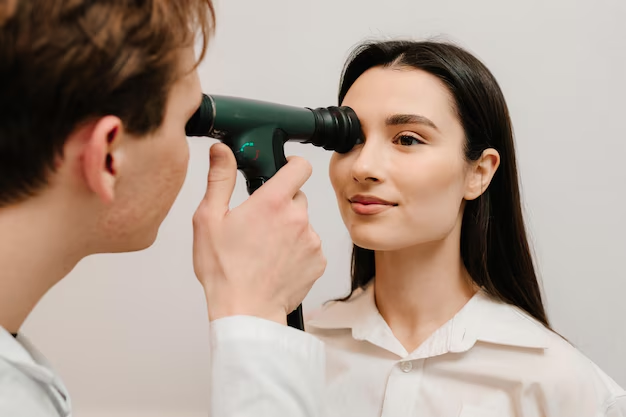Your Guide to Will I Need Glasses After Cataract Surgery
What You Get:
Free Guide
Free, helpful information about Cataract FAQ and related Will I Need Glasses After Cataract Surgery topics.
Helpful Information
Get clear and easy-to-understand details about Will I Need Glasses After Cataract Surgery topics and resources.
Personalized Offers
Answer a few optional questions to receive offers or information related to Cataract FAQ. The survey is optional and not required to access your free guide.
Improving Vision After Cataract Surgery: Will You Still Need Glasses?
Have you ever wondered about the clarity of vision following cataract surgery and whether you might still need glasses? With cataracts being a common issue affecting eyesight, understanding the potential outcomes and possibilities of life post-surgery can offer valuable insights and help set realistic expectations. This guide explores the different facets of vision correction after cataract surgery, offering a detailed look into what you might expect once the cataracts have been addressed.
Understanding Cataract Surgery
What Is Cataract Surgery?
Cataract surgery is a procedure aimed at removing the cloudy lens from the eye and replacing it with an artificial intraocular lens (IOL). This surgery is generally undertaken when cataracts result in significant vision impairment that affects daily activities. The procedure itself is highly common, frequently performed, and touted for its high success rate in restoring vision.
How Cataract Surgery Works
During the procedure, an ophthalmologist removes the clouded lens and replaces it with a synthetic lens. The type of IOL used can significantly affect post-surgery vision quality. There are various types of lenses, each of which offers different benefits and has different implications for the need for glasses.
Types of Intraocular Lenses (IOLs)
The choice of IOL significantly impacts whether or not you might need glasses after surgery. Here are the primary types to be aware of:
Monofocal Lenses
Monofocal lenses often correct vision at a single distance, meaning they require different lenses for near or distance vision. Most people with monofocal lenses will still need glasses for reading or other close-up activities but may achieve excellent distance vision without glasses.
Multifocal Lenses
Multifocal lenses are designed to allow focus at multiple distances. This type of lens might reduce or eliminate the need for glasses, covering near, intermediate, and far distances. However, adaptation to these lenses can vary, and some degree of image sharpness issues, such as halos or glare, might be experienced, particularly at night.
Accommodative Lenses
These lenses are designed to shift focus automatically between distances by moving within the eye. Similar to natural eye function, accommodative lenses may allow greater flexibility without the need for glasses, although not everyone experiences perfect vision across all distances with these.
Toric Lenses
For those who have astigmatism, toric lenses are specialized to correct this refractive error. Additionally, their design can enhance distance vision, and some might still need glasses for reading or close tasks.
Factors Affecting the Need for Glasses After Surgery
Pre-existing Eye Conditions
Conditions such as astigmatism, macular degeneration, or glaucoma may affect the results of cataract surgery. While surgery might improve some aspects of vision, glasses could still be necessary to correct other ongoing issues.
Visual Goals and Lifestyle
Your lifestyle and visual needs should inform lens choice. For instance, if your lifestyle demands frequent transitions between reading and long-distance vision, multifocal or accommodative lenses might be appealing.
Surgical Outcome
Even with prior expectations, surgical outcomes can vary among individuals. Factors like healing rates, post-surgery care, and general eye health can influence whether glasses are needed.
The Recovery Process: What to Expect
Immediate Post-Surgery
In the hours following surgery, vision might be blurry or hazy, akin to the sensation post-eye dilation. It's crucial to follow post-surgery care instructions provided by your healthcare provider during this period.
Long-Term Adjustment
Some degree of adjustment is expected as your eyes adapt to the new lens. Depending on the lens type, you might notice an improvement in vision quality and a reduction in dependency on glasses over a few weeks.
Weighing the Opportunities and Realities
Insights on Vision Post-Surgery
While many achieve significant improvements, results can vary. Here are a few bullet points highlighting common experiences and considerations:
- 👁️ Sharp Distance Vision: With the right IOL, distance vision often improves dramatically.
- 🔍 Reading & Close Work: About half of those undergoing surgery might still require glasses for reading with monofocal lenses.
- 💡 Light Sensitivity: Some might experience sensitivity to light, halos, or glare, especially when using multifocal lenses.
- 🌀 Astigmatism Correction: Choosing toric lenses can greatly improve vision in patients with pre-existing astigmatism.
Consultation and Planning
Given the varied outcomes, discussing your specific needs and expectations with an ophthalmologist is crucial. Consultations allow for personalized insights based on your unique vision profile and lifestyle needs.
Embracing New Visual Possibilities
Cataract surgery opens possibilities for improved vision clarity and quality of life. Whether or not you'll need glasses post-surgery depends on multiple factors, including lens choice, individual circumstances, and lifestyle needs. As you prepare for such a procedure, gaining an understanding of the potential outcomes, and having meaningful discussions with healthcare providers about goals and expectations, can greatly empower your decision-making process. Always remember that while the procedure holds the promise of enhanced vision, the journey post-surgery varies, and your experiences might differ from others'.
This thoughtful exploration of the question, "Will I need glasses after cataract surgery?" can arm you with information to approach your surgery and recovery with confidence, ultimately enriching your overall visual experience.
What You Get:
Free Cataract FAQ Guide
Free, helpful information about Will I Need Glasses After Cataract Surgery and related resources.

Helpful Information
Get clear, easy-to-understand details about Will I Need Glasses After Cataract Surgery topics.

Optional Personalized Offers
Answer a few optional questions to see offers or information related to Cataract FAQ. Participation is not required to get your free guide.


